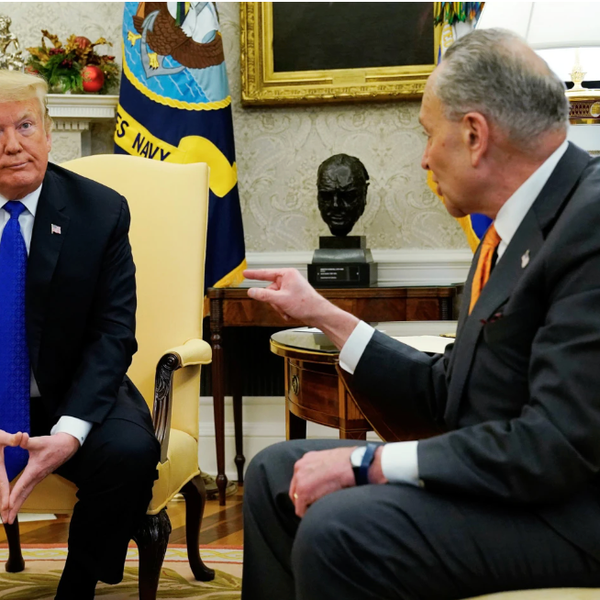
In this horrible time of economic collapse, it is truly touching to see so many corporate chieftains reaching out in solidarity to the hard-hit working class.
We know they're doing this, because they keep telling us they are — practically every brand-name giant has been spending millions of dollars on PR campaigns in recent weeks asserting that they're standing with us, declaring over and over, "We're all in this together."
Except, of course, they're really not standing anywhere near us. While we're waiting in endless lines at food banks and unemployment offices, the elites sit in posh executive suites, still getting fat paychecks, total health care and platinum-level pampering, as well as multibillion-dollar bailouts for their corporations. They'll even get a tax subsidy to pay for those "all in this together" ads.
The severity and gross disparity of our country's present economic collapse is not simply caused by a sudden viral outbreak but by a severe, decadeslong plutocratic policy of intentionally maximizing profits for the rich and minimizing everyone else's well-being. As the eminent economist Joseph Stiglitz rightly put it, "We built an economy with no shock absorbers."
Jobs, once the measure of a family's economic security, have steadily been shriveled to low-wage, unreliable work, untethered from a fair share (or any share) of the new wealth that workers create. In a relentless push for exorbitant, short-term profits, today's executives and financiers are focused solely on themselves, with no concern even for the long-term condition of their own corporate entity, much less for the common good. They've abandoned any pretense that a corporation is a civilized community of interdependent interests. For example, while top executives are richly covered, they're washing their hands of any responsibility for the health, retirement and other essential needs of their own workforce. Rely on food stamps, Obamacare and other publicly funded programs, they say, even as their lobbyists and for-sale lawmakers slash those safety net provisions in the name of helping rich shareholders and speculators take evermore profit.
These forces of American greed have forced millions of our families to live on the economic precipice — and all it takes is a virus to push them over.
In addition to exposing the gaping wealth divide in America, the COVID-19 crisis is spotlighting an ugly ethical divide. On the one hand, the pandemic has brought out the best in the American people — the selflessness of front-line nurses and doctors, for example, as well as the generous community spirit of local food businesses. Yet, on the other hand, it has also amplified one of the worst character flaws in our society, namely the "me-first" greed of corporate chieftains.
Just last August, we were given a glimmer of hope that a new, more democratic corporate ethic was emerging. In a major PR splash, the CEOs of 181 big-name giants signed a public pledge that they would run their corporations not solely to increase shareholder profits but also to benefit workers, communities and other "stakeholders" in our economy. Then, only five months later, BOOM! The coronavirus hit. Profits dropped. And the new magnanimous spirit of togetherness vanished from those corporate boardrooms. Immediately, masses of workers were punted out the door; health benefits were coldly terminated just when needed most; and the August pledge to serve the common good went into the shredder.
Well, retorted such pledge signers as Marriott International CEO Arne Sorenson, with revenues drying up, all promises are negated ... so, adios. In a March video message dispatching most of the hotel empire's employees, Sorenson cluelessly added this insult to their injury: "I wish you good health and a sense of optimism."
A couple of weeks later, the sting of corporate greed was felt even more acutely by workers when they learned that not all stakeholders were sharing their pain. While the Marriott board cut off workers' paychecks, it doled out $160 million to those who own its stock, a group that includes Sorenson. In fairness, the CEO did say he'll forgo some of his $1.3 million salary this year. But that's a disingenuous show of solidarity, since his annual pay has apparently been quietly goosed up with some $11 million in stock compensation and incentive pay. And while workers are now consigned to the unemployment line, Sorenson is reportedly in line for a 7.7 percent pay hike next year, plus a multimillion-dollar cash bonus.
In CorporateWorld, the more things change, the more they stay the same. That's why the corporate greed system will only be fixed when we outsiders impose real change on these incurably greed-headed insiders.
To find out more about Jim Hightower, and read features by other Creators Syndicate writers and cartoonists, visit the Creators webpage at www.creators.com.
- Another Huge Helping Of Corporate Welfare For Wall Street ... ›
- Plutocratic Rule In A Pandemic Is Terrible For Our Health - National ... ›
- A Corporate President's Message To The Working Class: 'Adios ... ›








